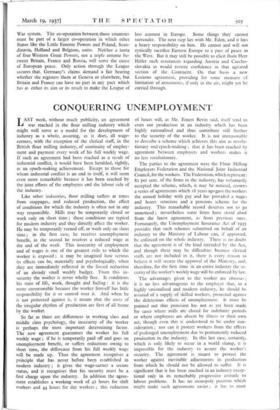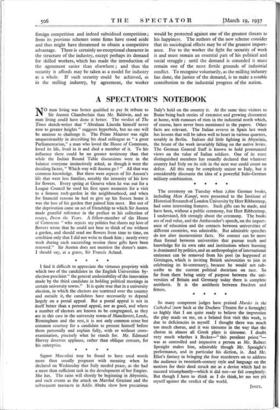CONQUERING UNEMPLOYMENT
Like other industries, flour milling suffers at times from stoppages, and reduced production, the effect of conditions for which the industry is often not in any way responsible. Mills may be temporarily closed or work only on short time ; these conditions are typical for modern industry and they directly affect the worker. He may be temporarily turned off, or work only on short time ; in the first case, he receives unemployment benefit, in the second he receives a reduced wage at the end of the week. This insecurity of employment and of wages is one of the greatest evils to which the worker is exposed ; it may be imagined how serious its effects can be, materially and psychologically, when they are immediately reflected in the forced reduction of an lready small weekly bUdget. From this in- security the worker is never wholly -free. It conditions his state of life, work, thought and feeling : it is the. more unreasonable because the worker himself has little responsibility for it or control over it. And when he is not protected against it, it means that the costs of the it4egular rhythm of production are first of all borne by the worket.
So .far, as there are differences in working class and middle class psychology, the insecurity of the worker is perhaps the most important determining factor. The new agreement guarantees the worker his full weekly' wage ; if he is temporarily paid off and goes on unemployment benefit, or suffers reductions owing to short time, the difference from his full weekly wage will be made up. Thus the agreement recognises a principle that has never before been established in modern industry ; it gives the wage-earner, a secure status, and it recognises. that his security must be a first charge upon the industry. In addition the agree- ment establishes a working week of 42 hours for shift workers and 44 hours for day workers ; this reduction of hours will, as Mr. Ernest Bevin said, itself tend to even out production in an industry which has been highly rationalised and thus contribute still further to the security of the worker. It is not unreasonable to describe a scheme which achieves this aim as revolu- tionary and epoch-Making ; that it has been reached by agreement between employers and workers makes it no less revolutionary.
The parties to the agreement were the Flour Milling Employers Federation and the National John Industrial Council, for the workers. The Federation, which represents 82 per cent. of the firms in the industry, has voluntarily accepted the scheme, which, it may be noticed, crowns a series of agreements which 18 years ago gave the workers the annual holiday with pay and has provided a wages and hours structure and a pensions scheme for the industry. This remarkable record deserves not to go unnoticed ; nevertheless some firms have stood aloof from the latest agreement, as from previous ones. Fortunately, the Unemployment Insurance Act of 1935 provides that such schemes submitted on behalf of an industry to the Ministry of Labour can, if approved, be enforced on the whole industry. There is no doubt that the agreement is of the kind intended by the Act, and though there may be difficulties because clerical staffs are not included in it, there is every reason to believe it will secure the approval of the Ministry, and, therefore, for the first time in an entire industry the se- curity of the worker's weekly wage will be enforced by law.
The advantages given to the worker are obvious ; it is no less advantageous to the employer that, in a highly rationalised and modern industry, he should be assured of a supply of skilled workers, protected against the deleterious effects of unemployment. It must be pointed out that provision has not. as yet been made for cases where mills ate closed for indefinite periods or where employees are absent by illness or their own act, though even this is understood to be under con- sideration ; nor can it protect workers from the effects of prolonged unemployment due to permanently reduced production in the industry. In this last case, certainly, which is only likely to occur in a world slump, it is impossible for the industry to assure the worker's security. The agreement is meant to protect the worker against inevitable adjustments in production from which he should not be allowed to suffer. It is significant that it has been reached in an industry excep- tional only in its remarkably progressive attitude to labour problems. It has no monopoly position which might make such agreements easier ; it has to meet foreign competition and indeed subsidised competition ; from its previous schemes some firms have stood aside and thus might have threatened to obtain a competitive advantage. There is certainly no exceptional character in the structure of the industry, except perhaps its demand for skilled workers, which has made the introduction of the agreement easier than elsewhere ; and thus the security it affords may be taken as a model for industry as a whole. If such security could be achieved, as in the milling industry, by agreement, the worker would be protected against one of the greatest threats to his happiness. The authors of the new scheme consider that its sociological effects may be of the greatest import- ance. For to the worker the fight for security of work is and must remain an essential part of his political and social struggle ; until the demand is conceded it must remain one of the most fertile grounds of industrial conflict. To recognise voluntarily, as the milling industry has done, the justice of the demand, is to make a notable contribution to the industrial progress of the nation,





































































 Previous page
Previous page